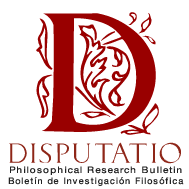Rani Lill Anjum (1) & Stephen Mumford (2) (1) | Texto Completo | Nota de Copyright | Índice Vol. 3 No. 4
(1) Norwegian University of Life Science, Ås, Norway | rani.anjum@nmbu.no || (2) University of Nottingham, UK | stephen.mumford@nottingham.ac.uk
Resumen
La mayoría de las teorías de causación asumen que debe envolverse algún tipo de necesidad, o que la causa debe ser enteramente suficiente para el efecto. Otros ya han sugerido que debería de ser posible obtener una teoría de causación a partir de una teoría de poderes o disposiciones. Un proyecto tal está muy lejos de estar completo, pero incluso aquí encontramos que ha faltado el punto clave en una teoría dispositiva de causación. Este escrito intenta establecer algunos de los principios más importantes de una teoría tal, y al hacerlo inclina la discusión existente en una nueva dirección.
Palabras Clave | Disposición · Causación · Necesidad · Prevención · Determinismo ·Probabilidad · Clasificación · Ausencias · Modalidad · Hume.
Abstract
Most theories of causation assume that it must involve some kind of necessity, or that the cause must be entirely sufficient for the effect. Others have already suggested that it should be possible to get a theory of causation from a theory of powers or dispositions. Such a project is far from complete but even here we find that the key point in a dispositional theory of causation has been lacking. This paper attempts to establish some of the most important principles of such a theory and in so doing turn the existing discussion in a new direction.
Keywords | Disposition · Causation · Necessity · Prevention · Determinism · Probability · Classification · Modality · Absences · Hume.
Recibido: 09-Enero-2014 | Aceptado: 17-Marzo-2014 | Publicado: 19-Diciembre-2014
Disputatio [Diciembre 2014 ], Volumen 3, Número 4, pp. 5-31
Artículo | [eng] | Resumen | BIBLID [2254-0601(2014)3:4; pp.5-31]
URI: http://gredos.usal.es/jspui/handle/10366/127713
